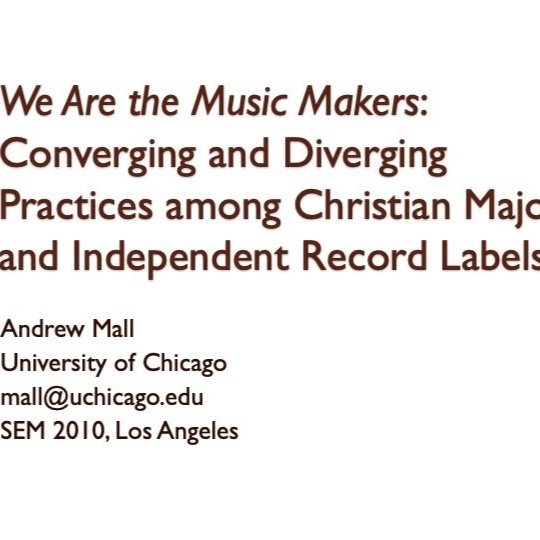
Mosh Pit Methods: Team-based Collaborative Fieldwork at a Hardcore Punk Festival
SEM conference presentation (2023). In this paper, we address the complexities of collaborating at these multiple levels: with each other, research assistants, festival organizers and staff, community leaders and members, and festival attendees. In attending to these challenges and opportunities, we open a conversation about the power and potential of team-based, collaborative fieldwork.
The Ethnomusicology of Religion: Fieldwork Methods and Ethics
SEM conference roundtable panelist (2017). Ethnographic fieldwork is often shaped by logistical issues including access, documentation, rapport, and fluency (both cultural and linguistic). Ethnomusicologists researching musics within religious or sacred contexts, however, face additional challenges. For example, moments of spiritual transcendence complicate participant-observation, both for ethnographers who belong to the faith tradition they are researching and for those who do not. Similarly, the varied expectations of the researcher’s audiences problematize documentation and representation. In this roundtable, participants consider these and other issues, addressing the ethical and methodological challenges of fieldwork posed by the ethnomusicology of religion.

Music Festivals as Scenes: Producing Ephemeral Space Annually at Cornerstone Festival
SEM conference presentation (2015). Based on interviews with festival staff, historical research, and ethnographic fieldwork in 2009–2012—including time working on the festival’s setup, stagehand, and teardown crews—this paper examines the production of space and place at Cornerstone Festival. In doing so, it contributes a vital link between scene theory and the growing ethnomusicological literature on festivals.
“We Are Called Here to Worship Together”: Ethnographic Outsiderness and Insiderness in Religious and Popular Culture
SEM conference presentation (2012). In this paper, based on several years of ethnographic research at the Anchor Fellowship, I address the challenges of fieldwork as a religious outsider and cultural insider. In constructing a rich description of an Anchor worship service based on my observations, those of church-goers, and formal interviews of Anchor pastors, this paper confronts the multivalence of experience and the interpretation thereof, demonstrating the importance of phenomenology to ethnography of religious and popular cultures.
The Price of Profit? Changing and Challenging Priorities in the Christian Recording Industry
SEM conference presentation (2011). In this paper, I examine EMI Christian Music Group (CMG), a major Christian record label (and division of EMI Ltd.), headquartered near Nashville, Tennessee. I provide a value-neutral analysis of the intersections of commerce, aesthetics, and theology. As with Keith Negus’s (1992, 1999) ethnographic research within the recording industry, my study illustrates that major record label practices and priorities are more nuanced than may be visible to outside observers.

We Are the Music Makers: Converging and Diverging Practices among Christian Major and Independent Record Labels
SEM conference presentation (2010). Based on ethnographic fieldwork and interviews with Christian music recording industry “cultural intermediaries” in 2009–2010, this paper’s nuanced study of Christian record labels contributes to a broader center-periphery perspective on the mediation of popular music in the United States.

Lost in the Sound of Separation: Mainstreams and Alternatives at a Christian Rock Festival
SEM conference presentation (2009). How do the performers, mediators, and listeners of alternative Christian rock negotiate these multiple tensions? How can their negotiations contribute to existing conceptions of mainstreams and alternatives? Describing the lived experiences of Cornerstone participants requires a perspective more subjectively nuanced than the strict dichotomies of previous models. In working through these ideas, this ethnography studies the ways in which Cornerstone contributes to participants’ self-conception of their Christian lifestyle: mainstream, alternative, and in-between.

Steady Diet of Nothing: Affinities, Sacrifices, and Change at Record Fairs
SEM conference presentation (2006). Building on Will Straw’s confluence of cosmopolitanism (“attentiveness to change occurring elsewhere”) and connoisseurship in his study of communities within popular music, this paper explores issues of everyday practice and changing identity through an ethnography of record dealers—individuals who act both as mediators and audience members within popular music exchange—using record fair events as the primary public cultural space.
Search and navigate extras
- 1A
- AAR
- Agence France-Presse
- AMS
- Amy Grant
- ARSC
- awards
- Baylor University
- Beer & Hymns
- Beyonce
- BFE
- Birmingham
- Boston
- Cambridge
- capital
- CCM
- CCMC
- Chicago
- Christian rock
- Christianity Today
- CNBC
- community
- congregational music
- crossover
- DePaul University
- discography
- DIY music
- documentaries
- emo
- Entertainment Weekly
- ethics
- festivals
- Fleetwood Mac
- Forum Daily News
- Furnace Fest
- Future of Pop
- Fyre Fest
- gamelan
- God Rock Inc
- hardcore
- IASPM
- IASPM-US
- introductions
- Keith Green
- Larry Norman
- Las Vegas
- Lindsey Buckingham
- Live Nation
- MEIEA
- mental health
- methods
- Michael Tait
- MIDSEM
- Money 4 Nothing
- music industries
- Nashville
- New England Conservatory
- Newsweek
- Northeastern Global News
- Northeastern University
- Nylon
- Oasis
- Ottawa
- panels
- Philadelphia
- podcast
- Pop Con
- Portland Press Herald
- punk
- radio
- record labels
- Rock Hall
- Rock That Doesn't Roll
- SAM
- San Antonio
- scene
- SCM
- SCSM
- SEM
- sing-alongs
- SMT
- Spotify
- Stevie Nicks
- streaming
- subculture
- Super Bowl
- Taylor Swift
- television
- Ticketmaster
- TicketNews
- TikTok
- TIME
- Tufts University
- Universal Music Group
- University of Chicago
- University of Pennsylvania
- vinyl
- Washington Post
- Whitney Houston
- worship
archives
- October 2025 1
- September 2025 3
- August 2025 3
- July 2025 3
- June 2025 2
- May 2025 8
- April 2025 4
- March 2025 1
- February 2025 3
- January 2025 1
- December 2024 4
- November 2024 2
- October 2024 1
- September 2024 1
- August 2024 3
- June 2024 3
- May 2024 1
- April 2024 5
- March 2024 2
- February 2024 6
- January 2024 1
- December 2023 4
- November 2023 2
- October 2023 4
- September 2023 1
- August 2023 1
- July 2023 1
- May 2023 1
- April 2023 2
- December 2022 2
- November 2022 1
- October 2022 3
- September 2022 3
- August 2022 1
- May 2022 1
- April 2022 1
- March 2022 2
- January 2022 1
- November 2021 1
- October 2021 3
- September 2021 3
- August 2021 2
- July 2021 3
- June 2021 2
- May 2021 6
- April 2021 11
- March 2021 2
- February 2021 2
- January 2021 2
- December 2020 1
- November 2020 3
- October 2020 1
- September 2020 1
- July 2020 1
- March 2020 1
- February 2020 3
- January 2020 1
- December 2019 1
- November 2019 4
- October 2019 1
- August 2019 1
- July 2019 1
- June 2019 1
- May 2019 1
- April 2019 1
- March 2019 4
- January 2019 2
- December 2018 1
- November 2018 1
- October 2018 2
- September 2018 1
- May 2018 1
- March 2018 3
- December 2017 1
- November 2017 2
- October 2017 1
- September 2017 2
- May 2017 1
- March 2017 1
- February 2017 1
- December 2016 2
- September 2016 1
- May 2016 1
- March 2016 1
- February 2016 1
- December 2015 1
- November 2015 2
- August 2015 2
- April 2015 1
- March 2015 2
- November 2014 1
- September 2014 1
- May 2014 1
- April 2014 1
- January 2014 1
- November 2013 1
- October 2013 2
- August 2013 1
- June 2013 1
- March 2013 1
- November 2012 1
- August 2012 1
- May 2012 2
- April 2012 1
- March 2012 1
- January 2012 1
- November 2011 1
- May 2011 1
- March 2011 1
- January 2011 1
- November 2010 1
- April 2010 1
- November 2009 1
- May 2009 2
- April 2009 1
- October 2008 1
- April 2007 1
- November 2006 1
- May 2006 1
- April 2006 1